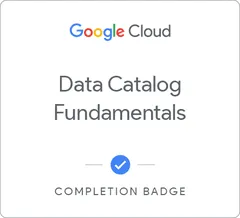
Data Catalog Fundamentals 
Gain an introduction to Data Catalog Fundamentals ▼
ADVERTISEMENT
Course Feature
![]() Cost:
Cost:
Free
![]() Provider:
Provider:
Qwiklabs
![]() Certificate:
Certificate:
Free Certification
![]() Language:
Language:
English
![]() Start Date:
Start Date:
On-Demand
Course Overview
❗The content presented here is sourced directly from Qwiklabs platform. For comprehensive course details, including enrollment information, simply click on the 'Go to class' link on our website.
Updated in [May 19th, 2023]
This course provides an overview of Data Catalog fundamentals. Participants will learn how to search and tag data assets and metadata with Data Catalog, as well as how to build tag templates that map to BigQuery table data. Additionally, participants will learn how to build MySQL, PostgreSQL, and SQLServer to Data Catalog Connectors. By the end of the course, participants will have a better understanding of how to use Data Catalog to discover, understand, and manage their data.
[Applications]
After completing this course, users can apply their knowledge of Data Catalog to their own organizations. They can use the service to quickly discover, understand, and manage all of their data. Additionally, they can use the tag templates to map BigQuery table data and build connectors for MySQL, PostgreSQL, and SQLServer. Finally, users can use Data Catalog to create a centralized repository of data assets and metadata, making it easier to find and access the data they need.
[Career Paths]
1. Data Catalog Manager: Data Catalog Managers are responsible for managing the data catalogs of organizations. They are responsible for creating and maintaining the data catalogs, ensuring that the data is properly organized and tagged, and that the data is accessible to the organization. Data Catalog Managers must have a strong understanding of data management principles and be able to work with a variety of data sources. As data catalogs become increasingly important for organizations, the demand for Data Catalog Managers is expected to grow.
2. Data Analyst: Data Analysts are responsible for analyzing data and providing insights to organizations. They use data catalogs to access and analyze data from a variety of sources, and then use their findings to inform decisions and strategies. Data Analysts must have strong analytical and problem-solving skills, as well as a deep understanding of data management principles. As data becomes increasingly important for organizations, the demand for Data Analysts is expected to grow.
3. Data Scientist: Data Scientists are responsible for developing and implementing data-driven solutions to complex problems. They use data catalogs to access and analyze data from a variety of sources, and then use their findings to develop models and algorithms that can be used to solve problems. Data Scientists must have strong analytical and problem-solving skills, as well as a deep understanding of data management principles. As data becomes increasingly important for organizations, the demand for Data Scientists is expected to grow.
4. Data Engineer: Data Engineers are responsible for designing, building, and maintaining data systems. They use data catalogs to access and analyze data from a variety of sources, and then use their findings to design and build data systems that can be used to store, process, and analyze data. Data Engineers must have strong technical and problem-solving skills, as well as a deep understanding of data management principles. As data becomes increasingly important for organizations, the demand for Data Engineers is expected to grow.
[Education Paths]
1. Bachelor of Science in Data Science: This degree path focuses on the development of skills in data analysis, data mining, machine learning, and artificial intelligence. Students will learn how to use data to solve complex problems and develop strategies for data-driven decision making. Additionally, they will gain an understanding of the ethical implications of data-driven decisions. This degree path is becoming increasingly popular as businesses become more data-driven.
2. Master of Science in Data Analytics: This degree path focuses on the development of skills in data analysis, data mining, machine learning, and artificial intelligence. Students will learn how to use data to solve complex problems and develop strategies for data-driven decision making. Additionally, they will gain an understanding of the ethical implications of data-driven decisions. This degree path is becoming increasingly popular as businesses become more data-driven.
3. Master of Science in Data Management: This degree path focuses on the development of skills in data management, data governance, and data security. Students will learn how to design and implement data management systems, develop data governance policies, and ensure data security. This degree path is becoming increasingly important as organizations strive to protect their data and ensure compliance with data privacy regulations.
4. Doctor of Philosophy in Data Science: This degree path focuses on the development of advanced skills in data analysis, data mining, machine learning, and artificial intelligence. Students will learn how to use data to solve complex problems and develop strategies for data-driven decision making. Additionally, they will gain an understanding of the ethical implications of data-driven decisions. This degree path is becoming increasingly popular as businesses become more data-driven.
Course Syllabus
Introduction to SQL for BigQuery and Cloud SQL
In this lab you will learn fundamental SQL clauses and will get hands on practice running structured queries on BigQuery and Cloud SQL.Using BigQuery in the Google Cloud Console
This lab shows you how to query public tables and load sample data into BigQuery using the GCP Console. Watch the following short video Get Meaningful Insights with Google BigQuery.Data Catalog: Qwik Start
In this lab you will explore existing datasets with Data Catalog and mine the table and column metadata for insights.Exploring Dataset Metadata Between Projects with Data Catalog
In this lab, you will explore existing datasets with Data Catalog and mine the table and column metadata for insights.Build and Execute MySQL, PostgreSQL, and SQLServer to Data Catalog Connectors
In this lab you will explore existing datasets with Data Catalog and mine the table and column metadata for insights.Course Provider

Provider Qwiklabs's Stats at AZClass
Discussion and Reviews
0.0 (Based on 0 reviews)
Explore Similar Online Courses

Dart Essentials

Introduction to iOS - Part 2

Python for Informatics: Exploring Information

Social Network Analysis

Introduction to Systematic Review and Meta-Analysis

The Analytics Edge

DCO042 - Python For Informatics

Causal Diagrams: Draw Your Assumptions Before Your Conclusions

Whole genome sequencing of bacterial genomes - tools and applications

Serverless Data Processing with Dataflow: Develop Pipelines

Serverless Data Processing with Dataflow: Foundations


Start your review of Data Catalog Fundamentals